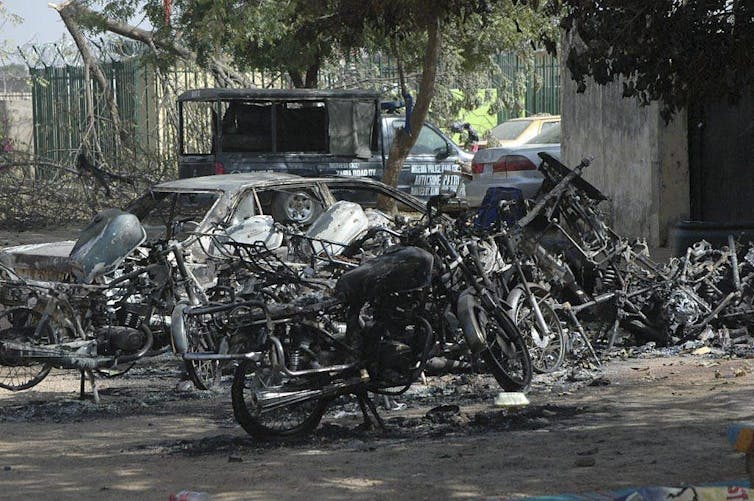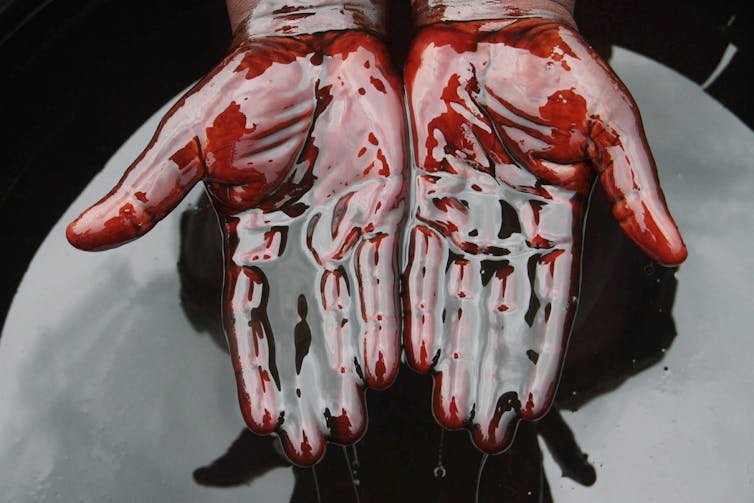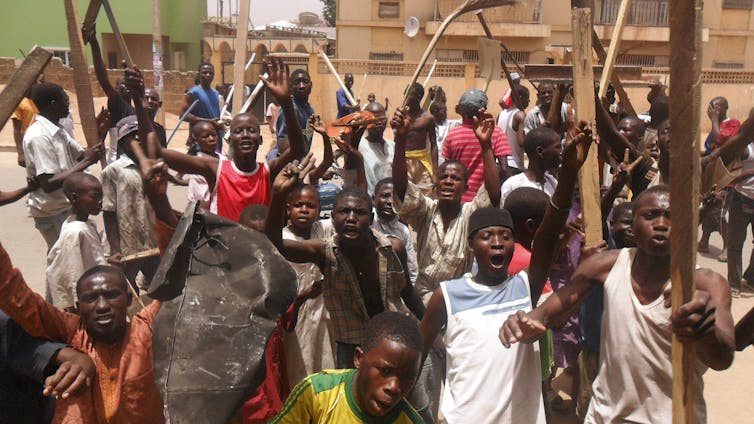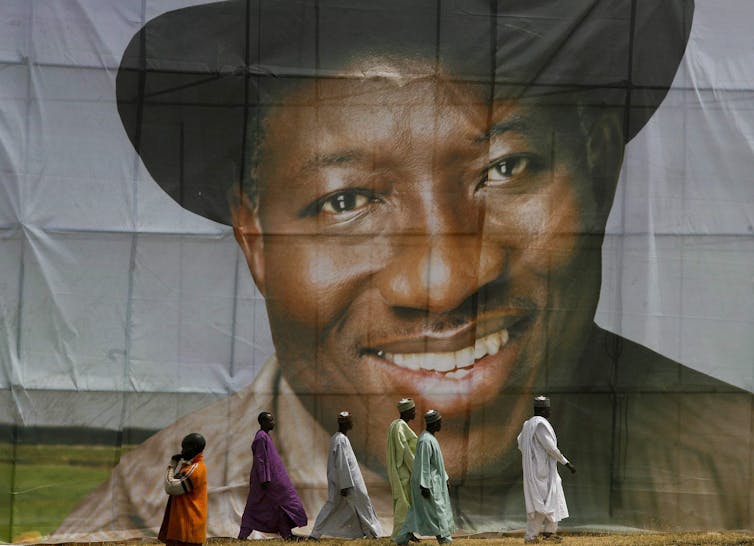
David Dorward, La Trobe University
The coming of the new year was not auspicious for Nigeria. Despite being rich in oil, the country is overwhelmed by corruption and violence.
The north of the country has been torn apart by terrorist attacks that saw police stations bombed, cars torched and the streets littered with bodies. More than 200 people have died so far in January alone.
How could a nation so rich in resources descend into such turmoil? The answer lies in a history of ethnic, religious and political fault-lines that go back centuries.
Deep fractures
Nigeria is riven by corruption at every level, from the policeman at the roadblock demanding a “fee” from a lorry driver to the most senior politicians – albeit the latter are able to wrap much of their largess in the cloak of legality.

A Nigerian Senator’s annual salary is A$173,000, with allowances of A$1.4m. The 2012 appropriation budget for State House, the President’s official residence, is A$107m. But 70% of Nigerians are classified as poor, with 35% living in absolute poverty.
The situation had been compounded by population growth, government mismanagement, corruption and climate change. Whereas once Nigeria was an agricultural exporting nation, it now imports food. Up to 80% in rural areas live below the poverty line. The once-proud peasant farmer, who sustained his family and exported surplus, is now an urban unemployed school leaver, ready fodder for any leader with a message of hope.
The Boko Haram Muslim terrorist sect in northern Nigeria, founded in 2002, translates as “no to Western education”. The organisation has been responsible for up to 1000 deaths in Nigeria over the past three years, including those from the most recent bombings in Kano.

In 2009, police assassinated its leader, Mohammed Yusuf, and the movement went underground, forging links with al-Qaida. It had little trouble recruiting among the urban underclass and has moved from isolated attacks on police and churches to coordinated atrocities against Muslims in major cities such as Kano, directly challenging President Goodluck Jonathan’s government as well as the Muslim establishment.
A nation in pieces
As a nation, Nigeria is fractured along ethnic, religious and class lines, encompassing more than 158 million people and 450 ethno-linguistic groups. The majority of those in northern Nigeria adhere to some form of Sunni Islam, while Christianity, in the guise of various Protestant denominations and Roman Catholicism, dominate in southern Nigeria. There are also significant adherents to traditional religious beliefs.
View Conflict in Nigeria in a larger map
Cultural concepts of political legitimacy, the rule of law and rights to land, differ markedly, resulting in a pluralistic state with few shared values.
The British colonial policy of “indirect rule” through tribal chiefs and Muslim Emirs fostered ethnic fragmentation, in which “strangers” had only restricted land rights. Christian missionaries brought Western education to the south, but were excluded by the British from Muslim areas. Christians were thereby advantaged over their northern counterparts in the post-colonial competition for employment within the bureaucracy and Western economic sector.
Delta blues
Northern Muslims’ resentment at perceived discrimination and disadvantage has led to repeated clashes in the fifty years following independence, especially in northern cities such as Kano and Kaduna, with their large Christian populations. There have also been sectarian Muslim vs Muslim conflicts, often sparked by local charismatic religious leaders.
The religious and ethnic became the main vehicles for political mobilisation in the post-colonial era, threatening to tear the nation apart. In 1966, a coup sparked riots across the north, the massacre of thousands of non-Muslim Igbo and, ultimately, secession of Igbo-dominated Biafra and the Nigerian civil war.

The military sought to diffuse ethnic tensions by creating 12 states, each with a share in the newly discovered oil bonanza, but this only fuelled minority demands for the creation of even more states. Today there are 36 states and 774 local government areas based on ethnicity and religion.
Revenues from oil production were divided among the states, ostensibly to enable the resource-poor to maintain social services. But successive military strongmen, politicians, corrupt bureaucrats and businessmen swindled much of the money. The people of the oil-producing areas of the Niger Delta, who bore the brunt of ecological degradation by the oil industry and human-rights abuses of the military, eventually took up arms.
Divide and rule
When the military eventually handed over power to a newly-elected civilian government in 1999 there was a general feeling of hope and renewal, often couched in terms of a romanticised history of the tribal-ethnic society.

Twelve northern states introduced various forms of Sharia law between 1999 and 2002, with Muslim politicians extolling a “return” to traditional values. The non-Muslim minority feared loss of human rights and civil liberties. But in non-Muslim areas, ethnicity and religion played no less a role in defining “community”, exclusion of “outsiders”, and notions of rights and morality.
One of the first acts of the new civilian government was to grant the oil-producing areas first call on 13% of locally-derived oil revenue, in addition to their share of revenue. While a long-overdue compensation for decades of neglect, this further enraged the poor and unemployed in other parts of Nigeria, especially in the Islamic North.
No end in sight
The 2011 elections were marked by violence, with more than a thousand killed. But despite widespread electoral fraud, these elections were more creditable than the preceding three. Some 72 of the 109 incumbent senators lost their seats, while only 100 of the 360 members of the House held their seats. President Goodluck Jonathan, a southern Christian, held on but violence escalated.

Jonathan is being urged by colleagues and the media alike to take control of the rapidly-deteriorating situation in Nigeria. The president, meanwhile, has vowed to focus on the economy.
But sadly, unless Nigeria’s political leaders are prepared to address problems of inequality, corruption, and a more socially equitable redistribution of oil revenue (worth US$59 billion in 2010), Nigeria faces a grim future.
David Dorward, Associate Professor, History, La Trobe University
This article is republished from The Conversation under a Creative Commons license. Read the original article.

